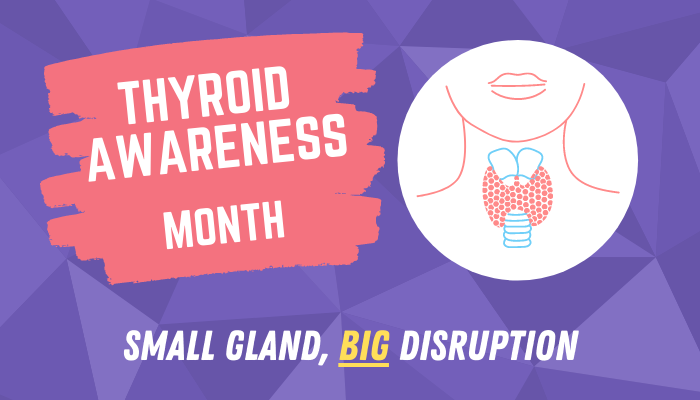
Thyroid Awareness Month
Up to 20 million people in the United States have medical problems involving the thyroid gland, and research has shown that over half of these disorders may be unknown or undiagnosed. January is Thyroid Awareness Month, an annual observance intended to highlight the importance of the thyroid and increase visibility of related disorders.
What is the thyroid?
The thyroid is located in the front of the neck, below the voice box. This small, butterfly-shaped gland is responsible for releasing hormones that perform highly important functions relating to the body’s growth, maturation, and metabolism. Thyroid hormones may be released to help regulate body temperature and heart rate, as well as to catalyze growth and brain development in children. If there is a hormonal imbalance (if the thyroid is producing too many or too few hormones) it can cause issues that range in type and severity.
Hyperthyroidism
The condition in which the thyroid is producing too much thyroxine (also known as T4, one of the primary hormones produced by the gland) is known as hyperthyroidism. This can cause the body’s metabolism to increase to unhealthy rate. This can cause symptoms such as sweating, elevated heartbeat, difficulty sleeping, increase in appetite and the frequency of bowel movements, and rapid, unintended weight loss. Hyperthyroidism often occurs with no symptoms, especially in older adults.
An overactive thyroid can be the result of a number of different conditions, including:
- Hyperfunctioning Thyroid Nodules: Overproduction of T4 may be caused by conditions such as Plummer’s disease and toxic adenoma or thyroid goiter. It may result from a noncancerous growth in one of the thyroid nodes that causes the gland to be enlarged.
- Thyroiditis: Typically occurring after a pregnancy, thyroiditis is when the thyroid gland becomes inflamed because of another underlying condition such as an autoimmune disorder. Thyroiditis can be painful, but not in every case.
- Graves’ Disease: This autoimmune disorder, which affects about one in 200 Americans, causes the body to attack the thyroid, resulting in the gland producing more hormones than are needed. This is the most common cause of hyperthyroidism.
You may be at a higher risk of developing hyperthyroidism if you have a family history of any of these conditions, especially in the case of Graves’ disease. Chronic illnesses such as diabetes may also be a factor, and women are at a higher risk of hyperthyroidism than men. While overproduction of T4 may in some cases be benign, potential complications can also include brittle bones, heart disease, and vision problems. Severe cases can cause a thyrotoxic crisis, a sudden and dangerous spike in hyperthyroidism symptoms.
Hypothyroidism
The other side of the coin is hypothyroidism, in which the thyroid gland is producing not enough, rather than too many, hormones. Symptoms of an underactive thyroid are usually quite slow to develop, but over time hypothyroidism can manifest itself as fatigue, depression, weight gain, increased sensitivity to cold, and joint and muscle aches. Children with hypothyroidism may lag in growth and development, with symptoms including late puberty, unusually short stature, and delayed appearance of permanent teeth.
Hypothyroidism is most commonly caused by:
- Autoimmune Disorders: There are some disorders which cause production of antibodies which attack the body’s own tissue. When these antibodies target the thyroid, it can impede the gland’s ability to produce a healthy amount of hormones. The most common contributor to hypothyroidism is a disorder known as Hashimoto’s thyroiditis.
- Overreaction to Hyperthyroidism Treatment: If you have been treated for an overactive thyroid, the result may be an overcorrection causing inhibited hormone production. This can be a result of medications or surgery which removes a part of the gland.
- Side Effects to Prescription Medication: Some medications, such as lithium, have been shown to have corollary effects that inhibit the thyroid gland.
Risk factors for hypothyroidism include previous treatments such as thyroid surgery or radiation therapy for cancer. Autoimmune disorders such as celiac disease and diabetes can contribute as well. You are also more likely to develop an underactive thyroid if you are a woman, over the age of 60, or have a family history of thyroid disorders. If untreated, hypothyroidism can cause depression, heart problems, and infertility. Rare cases can cause myxedema, a life-threatening condition whose symptoms include extreme cold sensitivity and drowsiness and can even result in a coma.
Thyroid Cancer
In some cases, thyroid cancer may be at the root of symptoms of either an overactive or underactive thyroid gland. The key is catching it early – in many cases, this cancer can be treated relatively easily and effectively with surgery to remove part of the thyroid gland. Prognosis is generally good for those who are diagnosed early on in the cancer’s development.
Diagnosing Thyroid Disorders
You should contact your doctor if you believe you may have a thyroid disorder. It’s important to be as thorough and detailed as possible about your symptoms, as many of the signs accompanying thyroid issues can also be symptoms of other medical problems. Labfinder offers three types of tests for hyper- and hypothyroidism: Thyroid Stimulating Hormone (TSH), Thyroid Blood Test, and Thyroid Panel. If you are currently undergoing treatment for hyperthyroidism, check-in regularly with your doctor to make sure that your hormone levels are being monitored.




Brian Tidal
The LabFinder Editorial Team is behind The Illuminator and The Insider, LabFinder’s consumer and business blogs.
Dr.Robert Segal
Dr. Segal is CEO and co-founder of LabFinder, as well as a board-certified cardiologist. He began practicing medicine in 2002 and has founded several businesses, including Medical Offices of Manhattan and Manhattan Cardiology.